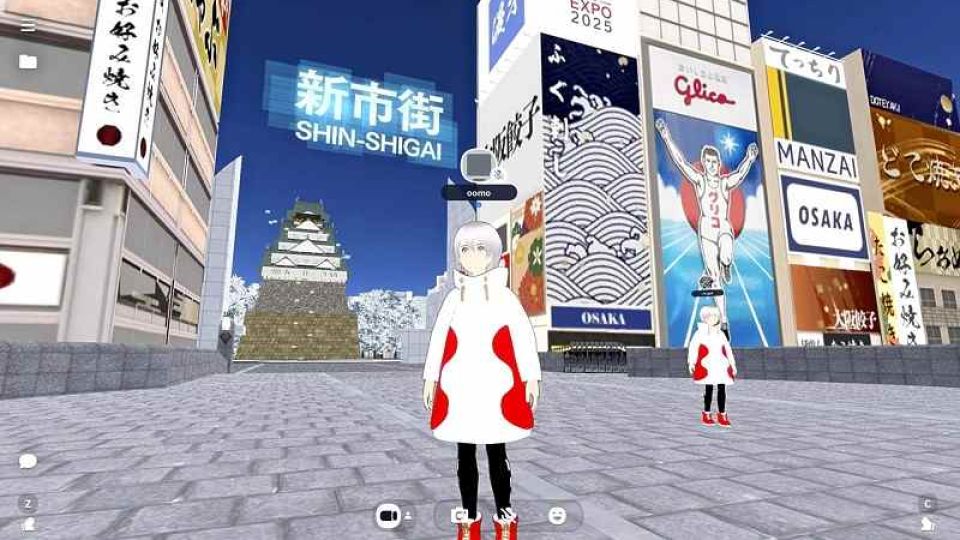October 19, 2022
OSAKA — Japan’s second largest city is virtually empty these days, at least in the metaverse.
Virtual Osaka was created by the Osaka prefectural and city governments, reproducing online landmark districts such as Dotonbori in a metaverse that has yet to attract as many visitors as expected. So far, ¥100 million has been spent on this failing initiative to build momentum for the 2025 Osaka-Kansai Expo.
The two Osaka governments aimed to spread Osaka’s charms to people around the world, but the number of monthly visitors to Virtual Osaka has recently plummeted to 5% of the peak in its initial month of December 2021.
Virtual Osaka opened on Dec. 16 for visitors to use avatars to virtually explore the city and sights in the prefecture, such as the Tower of the Sun, the symbol of Expo 1970 Osaka. Avatars can converse with each other and attend events such as live concerts. When the 2025 Expo starts, the Osaka Pavilion, operated by the two Osaka governments, will also be featured in the metaverse with the aim of attracting people to the real-life venue.
During that first month, 97,000 visitors entered the virtual world, but by this May and June, that number had dropped sharply to about 5,000 each month. Through September, only four events had been held, including live comedy performances, and all were free of charge.
Virtual Osaka had planned to update the virtual areas and this summer would have included temples and rice fields in the southern part of the prefecture. But the update has not yet been completed due to myriad delays.
Among the various posts on social media were, “I don’t understand the point of creating Virtual Osaka” and “It’s already turning into Virtual Ruin.”
Few events, updates
The prefectural and city governments know that in order to increase the number of visitors to Virtual Osaka, they must increase the number of events and expand the area in a hurry. It hasn’t worked the way they want, however, as the management of the virtual space is left up to private companies.
The joint venture to develop and operate the metaverse comprises KDDI Corp., Yoshimoto Kogyo Holdings Co. and Hakuhodo Inc. The contract was signed in August 2021 with the prefectural and city governments for ¥100 million.
This contract expired in March this year, and the agreement switched in April to one not taxpayer-funded. The purpose is to encourage the companies to utilize the metaverse in the long term through their own ideas.
The agreement stipulates that the three companies are responsible for organizing events and distributing content, but does not specify the number of events or when the virtual area should be updated. The two Osaka governments have been holding online discussions with the three companies once a month and have requested that they increase the frequency of their events, but this has not happened because it costs several million yen per event.
“We would like to see the development sped up, but we can’t say it strongly because we have no authority,” said an official at the Osaka prefectural government.
“We are now in the trial-and-error stage,” said an official at KDDI. “We are working on the project from a long-term perspective, hoping to make use of it even after the Expo is over. We would like to encourage other companies to utilize the space and eventually generate revenue with it.”
Yet to generate revenue
The overall metaverse market is expected to expand as more and more companies enter. However, the technology to create such systems is still in its infancy, and operating virtual worlds still involves trial and error, in a sense.
Virtual Shibuya opened in May 2020, reproducing the streets of the Shibuya district of Tokyo. It has hosted many events such as Halloween festivals and viewing soccer matches, with over 1 million participants on aggregate. However, most of the events are free, as is Virtual Osaka, meaning they have yet to generate revenue. The lack of regular visitors is also a challenge.
This metaverse is also operated by KDDI alongside the Shibuya City Tourism Association and Future Design Shibuya, an organization affiliated with Shibuya Ward. It differs from Virtual Osaka in that it started as a private initiative, but is only endorsed by the Shibuya Ward Office.

